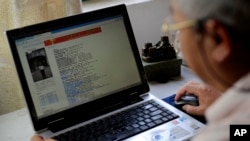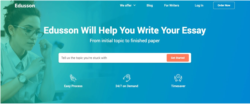Student Union
- By Will Schick
Buying Fake Term Papers Could Hurt Career

What would happen if you found out your dentist had hired someone to take the test on molars for them? Or if the city engineer never took a bridge building class and was responsible for testing their structural integrity?
Today, an internet search for “buy a college paper” will yield a half a billion results, and pages upon pages of websites offering anything from personal essays and lab reports, to nursing papers and academic dissertations.
Marketed as original content, written by native-English-speaking professionals, and seemingly plagiarism proof, websites with names like essay shark, fab editors, pay for essay, papers owl, and my paper writer promise to deliver everything to desperate students with a money back guarantee.
Alison Thomas, a lecturer at American University in Washington whose research focuses on information literacy, finds this development to be troubling. She said she believes the online college paper industry has the potential to wreak serious damage to the overall public good.
“The public has placed its trust in universities. There’s a certification that’s happening there. They’re saying ‘yes, this person is capable of doing all the things the degree suggests they’re capable of doing,’” she said.
Overwhelmed
Many supporters and patrons of these services, however, say they provide much needed support to students overwhelmed with school work. They characterize universities as degree mills that neglect to teach students real-world skills. Since most students never write another academic paper after graduation, they argue, why should they bother to write them in school?
Thomas concedes that many students, particularly those not accustomed to writing in English, may struggle with their college writing assignments. But paper-writing skills, she said, are important because they develop the kinds of “habits of mind” academic institutions and universities widely regard as crucial.
“These are life skills, these are professional skills,” she said, adding that “to think critically, to communicate clearly, to process information, to do something with ideas” are competences that “transcend specific fields of study.”
On a recent online forum, one student admitted to using a writing service for two college papers. Despite receiving a B on both assignments, the student advised others against buying papers. It was best to “do your own work, cuz it just gets harder,” they said, meaning skipping lessons might come back in upper-level classes to haunt them.
In the Medium article “How to Cheat Your Way Through School,” writer J. Naran concurred. He claimed to have used the “global online marketplace” to cheat his way through one semester of college.
As a scholarship recipient, Naran said he needed to maintain a 3.75 GPA, but found himself struggling to keep his grades up after a romantic breakup and a friend’s calamity.
Naran said cheating will catch up with the cheater. Aside from the costs of paying others for work, students might find themselves working twice as hard later to catch up. Naran did not respond to requests for comment about his article.
Ghostwriter for hire
Victor, a college drop-out and published poet, said he found himself in desperate financial trouble a few years ago. He needed money to pay his rent and for his groceries. He started a website marketing himself as a ghostwriter for hire.
He was approached by a student who asked him to write a first-year psychology paper for her. After she received an A, word spread, and Victor said he soon started to average 10 papers per week.
In an interview, Victor admitted to feeling guilt and shame about this work, calling it “wrong.” He said the most he ever earned was $700 for half of a student’s academic dissertation. Victor spoke only if his name were not disclosed, fearing damage to his reputation. He also said he worried it would impact a pending book contract.
There are thousands of ghostwriters for hire online, many who claim to have advanced degrees. One academic who also feared being fired if their identity were revealed admitted to writing papers for money. They said they needed the money.
Unlike traditional freelance writing, ghostwriting college papers can be quite lucrative, and knowledgeable writers can pocket hundreds of dollars for minimal work.
The college paper site Edusson claims their “expert” writers earn an average of $1,500 to $2,000 a month. The website writerbay.com offers writers the opportunity to choose from posted “jobs” and make anywhere from $75 for a 4,000-word nursing paper to $439 for a 1,100-word marketing paper.
Victor says he no longer writes college papers for money. After writing so much on so many topics, he now considers himself to be somewhat of a renaissance man. Writing papers, he said, has helped to educate him.
Justine Zapin, an adjunct professor who teaches first-year composition at American University in Washington said in an interview that it is common for non-native English speaking students to feel pressure to hire someone to write their essays for them.
Easily identified as false
But according to Zapin, professors at colleges across the U.S. can easily identify a falsified admissions essay by simply comparing it to the language used in assigned classroom work.
“The difference is really obvious,” she said.
This type of cheating may be the reason many universities are turning to third party interviewing services as part of their admissions process. Today, companies such as Initial View, based in China, videotapes interviews with prospective students in part, to verify and showcase their English speaking skills.
In any case, students who opt to intentionally cheat the system run the risk of being found out.
Like many universities, the academic integrity office at the University of California at San Diego (UCSD) explicitly states on their webpage that students who are caught using online college paper writing services “almost always” end up suspended or dismissed from their universities. In 2017-2018, there were a total of 845 academic integrity allegation cases at UCSD.
Students, they argue, should strive to be truthful in their work because “society relies on the UCSD degree to mean something,” namely, “that a graduate has the requisite knowledge and abilities to perform in a professional role.”
See all News Updates of the Day
- By VOA News
Competition grows for international students eyeing Yale

It’s tough to gain admission to Yale University, and it’s getting even tougher for international students as standout students from around the world set their sights on Yale.
The Yale Dale News, the campus newspaper, takes a look at the situation here.
- By VOA News
Student from Ethiopia says Whitman College culture made it easy to settle in

Ruth Chane, a computer science major from Ethiopia, writes about her experiences settling into student life at Whitman College in the U.S. state of Washington.
"The community at Whitman College made sure I felt welcomed even before I stepped foot on campus," she says.
- By VOA News
Claremont Colleges student gets a shock when she heads home to Shanghai

In The Student Life, the student newspaper for the Claremont Colleges, a consortium of five liberal art colleges and two graduate schools in Claremont, California, student Rochelle Lu writes about readjusting to her Shanghai home after spending a semester in the United States.
- By VOA News
Cedarville University aims to ease transition for international students

Cedarville University in the U.S. state of Ohio says it’s got more than 140 international students representing 44 countries.
Here, the school interviews Jonathan Sutton, director of international student services. He talks about his job and the opportunities for international students on campus.
- By VOA News
Morehouse College offers prospective students tips on applying and thriving

Morehouse College, a private, historically Black liberal arts college in the U.S. state of Georgia, offers a guide for international students interested in attending the school.
Among the tips to apply and thrive at Morehouse:
- Take advantage of the school’s orientation program
- Turn to the school’s Center for Academic Success for tutoring, support and more
- Immerse yourself in campus life via clubs and societies
- By Reuters
US reviews Columbia University contracts, grants over antisemitism allegations

The administration of President Donald Trump said on Monday it will review Columbia University's federal contracts and grants over allegations of antisemitism, which it says the educational institution has shown inaction in tackling.
Rights advocates note rising antisemitism, Islamophobia and anti-Arab bias since U.S. ally Israel's devastating military assault on Gaza began after Palestinian Hamas militants' deadly October 2023 attack.
The Justice Department said a month ago it formed a task force to fight antisemitism. The U.S. Departments of Health and Education and the General Services Administration jointly made the review announcement on Monday.
"The Federal Government's Task Force to Combat Anti-Semitism is considering Stop Work Orders for $51.4 million in contracts between Columbia University and the Federal Government," the joint statement said.
The agencies said no contracting actions had been taken yet.
"The task force will also conduct a comprehensive review of the more than $5 billion in federal grant commitments to Columbia University."
The agencies did not respond to requests for comment on whether there were similar reviews over allegations of Islamophobia and anti-Arab bias.
Columbia had no immediate comment. It previously said it made efforts to tackle antisemitism.
College protests
Trump has signed an executive order to combat antisemitism and pledged to deport non-citizen college students and others who took part in pro-Palestinian protests.
Columbia was at the center of college protests in which demonstrators demanded an end to U.S. support for Israel due to the humanitarian crisis caused by Israel's assault on Gaza. There were allegations of antisemitism and Islamophobia in protests and counter-protests.
During last summer's demonstrations around the country, classes were canceled, some university administrators resigned and student protesters were suspended and arrested.
While the intensity of protests has decreased in recent months, there were some demonstrations last week in New York after the expulsion of two students at Columbia University-affiliated Barnard College and after New York Governor Kathy Hochul ordered the removal of a Palestinian studies job listing at Hunter College.
A third student at Barnard College has since been expelled, this one related to the occupation of the Hamilton Hall building at Columbia last year.
Canada’s immigration overhaul signals global shift in student migration
From Europe to North America, nations are tightening their immigration policies. Now Canada, long seen as one of the world's most welcoming nations, has introduced sweeping changes affecting international students. The reforms highlight a growing global trend toward more restrictive immigration policies. Arzouma Kompaore reports from Calgary.
Trump administration opens antisemitism inquiries at 5 colleges, including Columbia and Berkeley

The Trump administration is opening new investigations into allegations of antisemitism at five U.S. universities including Columbia and the University of California, Berkeley, the Education Department announced Monday.
It's part of President Donald Trump's promise to take a tougher stance against campus antisemitism and deal out harsher penalties than the Biden administration, which settled a flurry of cases with universities in its final weeks. It comes the same day the Justice Department announced a new task force to root out antisemitism on college campuses.
In an order signed last week, Trump called for aggressive action to fight anti-Jewish bias on campuses, including the deportation of foreign students who have participated in pro-Palestinian protests.
Along with Columbia and Berkeley, the department is now investigating the University of Minnesota, Northwestern University and Portland State University. The cases were opened using the department's power to launch its own civil rights reviews, unlike the majority of investigations, which stem from complaints.
Messages seeking comment were left with all five universities.
A statement from the Education Department criticized colleges for tolerating antisemitism after Hamas' Oct. 7, 2023, attack on Israel and a wave of pro-Palestinian protests that followed. It also criticized the Biden administration for negotiating "toothless" resolutions that failed to hold schools accountable.
"Today, the Department is putting universities, colleges, and K-12 schools on notice: this administration will not tolerate continued institutional indifference to the wellbeing of Jewish students on American campuses," said Craig Trainor, the agency's acting assistant secretary for civil rights.
The department didn't provide details about the inquiries or how it decided which schools are being targeted. Presidents of Columbia and Northwestern were among those called to testify on Capitol Hill last year as Republicans sought accountability for allegations of antisemitism. The hearings contributed to the resignation of multiple university presidents, including Columbia's Minouche Shafik.
An October report from House Republicans accused Columbia of failing to punish pro-Palestinian students who took over a campus building, and it called Northwestern's negotiations with student protesters a "stunning capitulation."
House Republicans applauded the new investigations. Representative Tim Walberg, chair of the Education and Workforce Committee, said he was "glad that we finally have an administration who is taking action to protect Jewish students."
Trump's order also calls for a full review of antisemitism complaints filed with the Education Department since Oct. 7, 2023, including pending and resolved cases from the Biden administration. It encourages the Justice Department to take action to enforce civil rights laws.
Last week's order drew backlash from civil rights groups who said it violated First Amendment rights that protect political speech.
The new task force announced Monday includes the Justice and Education departments along with Health and Human Services.
"The Department takes seriously our responsibility to eradicate this hatred wherever it is found," said Leo Terrell, assistant attorney general for civil rights. "The Task Force to Combat Anti-Semitism is the first step in giving life to President Trump's renewed commitment to ending anti-Semitism in our schools."
- By VOA News
STEM, business top subjects for international students

The Times of India breaks down the most popular subjects for international students to study in the U.S.
STEM and business lead the pack. Read the full story here. (January 2025)
- By VOA News
Safety and visa difficulties among misconceptions about US colleges

U.S. News & World report addresses some of the misconceptions about U.S. colleges and universities, including the difficulty of getting a visa.
Read the full story here. (January 2025)
- By VOA News
Work opportunities help draw international students to US schools

US News & World Report details the three top factors in foreign students' decision to study in the U.S. They include research opportunities and the reputation of U.S. degrees. Read the full story here. (December 2024)
- By VOA News
British student talks about her culture shock in Ohio

A British student who did a year abroad at Bowling Green State University in Ohio talks about adjusting to life in America in a TikTok video, Newsweek magazine reports.
Among the biggest surprises? Portion sizes, jaywalking laws and dorm room beds.
Read the full story here. (December 2024)
- By VOA News
Harvard's Chan School tells international students what to expect

Harvard's T.H. Chan School of Public Health reaches out to international students by detailing the international student experience at the school.
Learn more about housing, life in Boston and more here.
- By Reuters
China unveils plan to build 'strong education nation' by 2035

China issued its first national action plan to build a "strong education nation" by 2035, which it said would help coordinate its education development, improve efficiencies in innovation and build a "strong country."
The plan, issued Sunday by the Communist Party's central committee and the State Council, aims to establish a "high quality education system" with accessibility and quality "among the best in the world."
The announcement was made after data on Friday showed China's population fell for a third consecutive year in 2024, with the number of deaths outpacing a slight increase in births, and experts cautioning that the downturn will worsen in the coming years.
High childcare and education costs have been a key factor for many young Chinese opting out of having children, at a time when many face uncertainty over their job prospects amid sluggish economic growth.
"By 2035, an education power will be built," the official Xinhua news agency said, adding that China would explore gradually expanding the scope of free education, increase "high-quality" undergraduate enrolment, expand postgraduate education, and raise the proportion of doctoral students.
The plan aims to promote "healthy growth and all-round development of students," making sure primary and secondary school students have at least two hours of physical activity daily, to effectively control the myopia, or nearsightedness, and obesity rates.
"Popularizing" mental health education and establishing a national student mental health monitoring and early warning system would also be implemented, it said.
It also aims to narrow the gap between urban and rural areas to improve the operating conditions of small-scale rural schools and improve the care system for children with disabilities and those belonging to agricultural migrant populations.
The plan also aims to steadily increase the supply of kindergarten places and the accessibility of preschool education.
- By VOA News
A look at financial aid options for international graduate students in US

The Open Notebook, a site focusing on educating journalists who cover science, has complied a list of U.S. graduate program financial aid information for international students.

